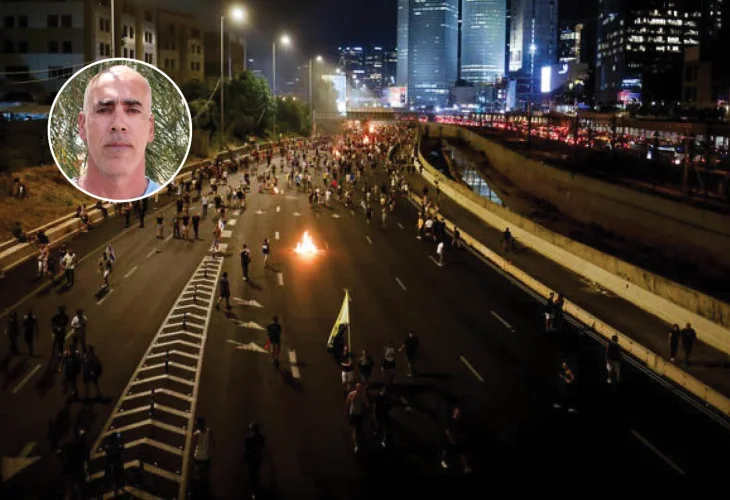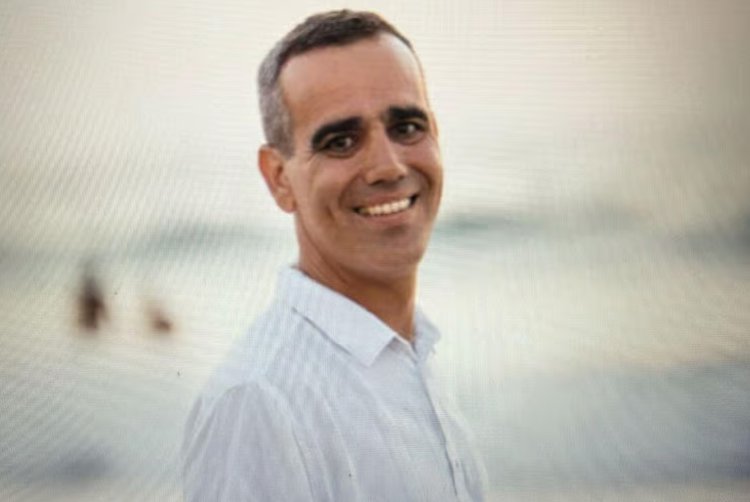"Protests Play into Sinwar's Hands": Nadav Miran's Plea for Unity in Difficult Times
Nadav Miran misses his brother Omri, kidnapped by Hamas to Gaza, and fights for his return from captivity, but beyond that, he wishes to cry out from the heart: "We are one family, let's be more united."
 Nadav Miran (Background photo: Chaim Goldberg/Flash90)
Nadav Miran (Background photo: Chaim Goldberg/Flash90)It has been a year since Hamas terrorists invaded Israeli territory and committed massacres in the southern communities—yet the wound remains open and refuses to heal. After one of the most painful years in Israeli history, the people of Israel have yet to fully process the implications. "This is a reality we will never fully digest or get used to," says Nadav Miran, whose brother Omri is held captive by Hamas in Gaza.
Miran will never forget the moment he received the news of Omri's abduction. "Suddenly, I found myself thrown into the deepest waters of the world," he recalls those chilling moments when his father announced in the family WhatsApp group that Omri had been kidnapped to Gaza. "We were suddenly faced with such a difficult event—as the days went by, we understood more and more its awful significance. How will we cope now? We were overwhelmed with anxiety for Omri's safety. What's happening to him now? Where is he at all?".
 Omri Miran, the brother kidnapped to Gaza (Photo: Courtesy of the family)
Omri Miran, the brother kidnapped to Gaza (Photo: Courtesy of the family)Signs of Life from Captivity
After a long period of mental attrition and uncertainty about his condition, Hamas released a recording showing Omri in one of the tunnels in the Strip. "Until that moment, I kept myself out of the media game," his brother says. "Omri's wife told the story from the best perspective, and I chose to step back. After the tape was released, I couldn't remain silent. I entered the media arena with one goal: to push the government to go all the way to bring the hostages home".
When you say "go all the way," do you mean "deal now"—in the spirit of the protests taking place?
"Absolutely not," he asserts. "The deals discussed in the media are not feasible, as Hamas says 'no' to every deal. These are baseless deals. The discussions between Israel and the mediating countries are completely unnecessary, because when it all boils down to handing the paper to Hamas—we get a big 'no' from them.
"Hamas can't remain in power, and Israel can't exit Gaza. Israel needs to apply pressure on Hamas and take responsibility for the humanitarian aid that lines Hamas' coffers. We continue to fund Hamas, and it doesn't align with the government's goal to topple their regime".
In other words: they used to transfer money in suitcases, and now it's in trucks?
"The State of Israel has always transferred money to Hamas in various capacities. Humanitarian aid is a kind of substitute: instead of bringing money through Qatar, it goes through the Philadelphi Route".
"Don't Go Out to Protest"
Speaking of the Philadelphi Route: a withdrawal from the route in exchange for the release of the hostages—is that something you'd consider?
"The Philadelphi Route is essentially a media spin. The media does this only to blame Netanyahu and to focus the attention on the idea that he's supposedly obstructing the deal because of his insistence not to leave the route. There's no truth here. What there is, however, is a trend to deflect citizens from the fact that Sinwar is the one saying 'no' to every proposed deal.
"It's a strategic route important to Israel's security," Miran emphasizes. "We captured it to neutralize Hamas' control over it, so it must remain in Israeli hands. It's the only way we can ensure that no terrorist regime rises again to arm against us".
So you're against a "deal now" and you're against leaving the Philadelphi Route. Are the left-wing protesters, those who call for a "deal now," harming the hostages?
"Anyone protesting in this context is causing great harm to Israel and the hostages, harm that can't be described. Those who truly want a deal and care about the hostages must not go out to protest. This is exactly what Yahya Sinwar wants: to dismantle Israel. And the fact is, since the protests began, Sinwar has hardened his stances. These protests play into Sinwar's hands and serve his interests".
That's a strong statement.
"Anyone protesting serves Yahya Sinwar and blocks any possible hostage deal," Miran reiterates. "The protesters are using the hostages to topple the government, and they should be ashamed. Maybe they want to return the hostages along the way, but that's not their real goal. They want only to topple the government, and it's an unparalleled audacity".
Does every citizen who protests for the hostages' release genuinely have an agenda to topple the government?
"Maybe they convince themselves that the protests are for the hostages, but in reality, they come with signs saying 'Bibi's to blame.' They ignore the fact that it's not Netanyahu to blame, but Sinwar who blocks every deal. I don't believe they're protesting for the hostages. They hit the streets to topple Netanyahu.
"I'm not a Netanyahu person, and I've never voted Likud," Miran clarifies. "But Netanyahu is the most suitable prime minister to manage the situation. The protesters are injecting politics into an event that mustn't be tainted by it. They're using the hostages to bring down the government".
Stay Strong, Brother
As the interview nears its end, Miran wishes to express a heartfelt plea: "I am not a religious man, but I love religion with all my heart. I love my nation, love my Judaism, love my people, and I call upon all sectors to be more united and accepting of one another. The divisive and inciting discourse against such amazing sectors, like the ultra-Orthodox or religious-nationalist community, personally offends me. After all, we are one family, we are all brothers. What will become of us? Where will the media's incitement drag us further?".
Your plea is a genuine and heartfelt one.
"Unequivocally. It's a cry coming from the depths of my heart. Despite not defining myself as a religious person, I am driven mad by the incitement against religion. It drives me crazy. The media has instilled fear among citizens against these wonderful sectors, and it's simple political maneuvering tarnishing the beautiful religion we have".
In conclusion: What would you like to say to Omri?
This is the first moment in the interview where Miran falls into a long, sad silence. "Omri," he addresses him directly. "Continue being strong, because I am sure you are strong. Know that we are all trying our utmost to bring you back—you and the other hostages—as quickly as possible. I don't know when it will really happen, but you need to stay strong until you return to us, and may it happen swiftly".

